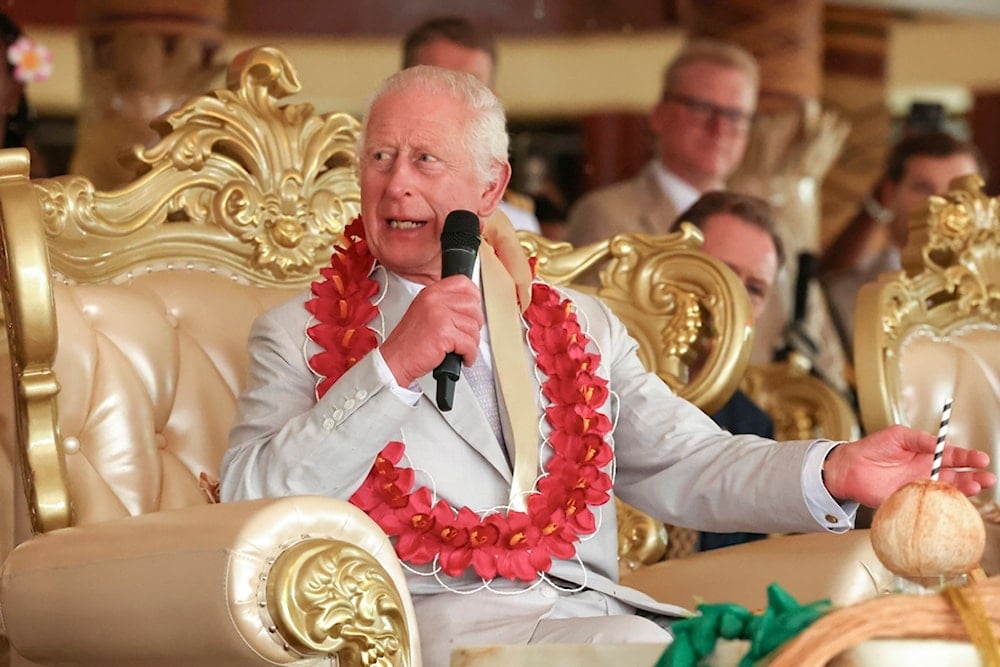UK, not concerned with past, refuses to pay ex-colonies reparations
As the commonwealth former colonies continue calling for reparations, recognition, and apologies for the UK's role in the transatlantic slave trade, the government remains in opposition to all their requests.
-

Britain's King Charles III speaks during the bestowing and farewell ceremony on the final day of the royal visit to Samoa at the Siumu Village in Apia, Samoa, Saturday, Oct. 26, 2024. (AP)
Commonwealth countries are calling for talks regarding slavery reparation, but the United Kingdom is rejecting paying its former colonies financial compensation, analysts reported.
Speaking to AFP, Sascha Auerbach, director of the Institute for the Study of Slavery at Nottingham University, said few factions of British society are open to the idea of reparations, but the majority remains in strong opposition.
Last week's summit in Samoa saw 56 members of the Commonwealth declaring that the "time has come" to discuss the legacy of the transatlantic slave trade, marking a significant moment that could lead to future reparations. The nations urged Britain and other former colonial powers to apologize for slavery and the harms of colonization, as well as initiate discussions on compensation.
However, UK Prime Minister Keir Starmer, a human rights lawyer, rejected both requests, claiming he wants to look forward rather than revisit the past and "have "very long endless discussions about reparations."
Robert Jenrick, a candidate for the new Tory leadership, has stated that criticizing the British Empire is unpatriotic, noting that "territories colonized by our empire were not advanced democracies."
"Many had been cruel, slave-trading powers. Some had never been independent. The British empire broke the long chain of violent tyranny as we came to introduce -- gradually and imperfectly -- Christian values," he added.
Although Britain has acknowledged its historical role in slavery with expressions of remorse, it has hesitated to consider financial reparations due to the potentially high costs.
A 2023 report by United Nations judge Patrick Robinson estimated that the UK might owe over £18 trillion (or 21 trillion euros) for its involvement in slavery across 14 countries, factoring in unpaid wages, the trauma inflicted, and damages owed to descendants. Thus far, Commonwealth nations have not proposed their own reparations figures.
However, it does seem that the nations do not want monetary compensation as much as accountability and recognition. Critics in the UK argue that a public apology could lead to legal action against the country, although the Dutch government and king issued an apology for slavery last year but have not faced any lawsuits so far.
The British royal family has yet to issue a formal apology. However, during a visit to Kenya last year, King Charles III expressed his "greatest sorrow and deepest regret" for the "abhorrent and unjustifiable acts of violence" inflicted on Kenyans during colonial rule.
Parallels in Portugal
The matter of reparation in the post-colonial age has rippled through Europe as well. In Portugal, the government refused to initiate any reparation processes for the atrocities committed during the colonial transatlantic era.
Portuguese ships began abducting and transporting Africans in the 15th century, who were sold into slavery, mostly in Brazil. By the 19th century, Portugal had enslaved at least 6 million Africans.
According to The Guardian, the government addressed the issue in a statement to Lusa, a Portuguese news outlet, saying it aimed to “deepen mutual relations, respect for historical truth and increasingly intense and close cooperation, based on the reconciliation of brotherly peoples."
However, it added that no programs or processes existed for reparation, which was consistent with previous governments.
President Marcelo Rebelo de Sousa, on the other hand, stated that reparation was a necessity, sparking controversy and criticism among the government's right-wing parties.
The government, however, described its relations with former colonies as "truly excellent", highlighting collaboration in education, language, culture, and healthcare, alongside financial, budgetary, and economic cooperation, omitting the possibility of reparation.
Read more: Black History Month: black oppression at the hands of the Europeans

 4 Min Read
4 Min Read








